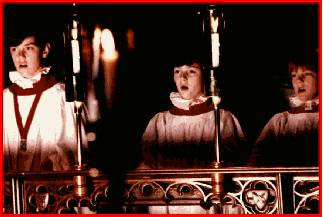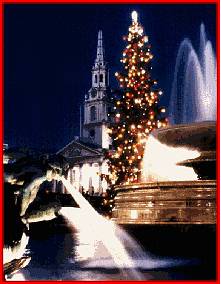 |
 |
 |
 |
 |
 |
 |
 |
 |
 |
 |
 |
|
|
|
|
|
|
|
|
|
|
|
|
|
|
|
|
|
|
|
 |
|
|
|
|
|
|
No other people have observed the Christmas season with such wild abandon as the English, and they have been celebrating it for more than a thousand years. According to legend, King Arthur made merrie in York in 521 surrounded by "minstrels, gleemen, harpers, pipe-players, jugglers, and dancers."
|
|
|
|
|
|
|
|
|
|
|
|
|
|
Ever since, except for a brief period of Cromwellian rule when Christmas went underground, hearty feasting and merrymaking have been the order of the season.
"For many people, Christmas was reinvented by the Victorian/nineteenth century society," says
Countess Maria Hubert von Staufer, Director of Christmas Archives International in the United Kingdom. "It is a popular misconception that Christmas in England was eradicated by the Cromwellians in the seventeenth century and was only reinvented by the Victorians."
According to the Countess, the customs that eighteenth-century people observed were handed down in undisturbed continuation from earlier times. "Although the customs went underground they remained solid traditions celebrated by all who wished to do so," she says.
In one of her recently published books, Jane Austen's Christmas: The Festive Season in Georgian England, the historian shows some of the most interesting and hitherto hidden aspects of the British Christmases of yesteryear celebrated by the whole Austen family.
Today, the British Isles usher in the holiday season with jubilant sound: church bells pealing, handbells ringing, choirs singing, and buskers and waits performing on street corners.
|
|
|
|
|
|
|
|
|
|
|
 |
|
|
|
|
|
|
Caroling is one of the oldest customs in Great Britain, going back to the Middle Ages when beggars, seeking food, money, or drink, would wander the streets singing holiday songs.
|
|
|
|
|
|
|
|
|
|
|
|
|
|
|
|
Wandering minstrels traveled from hamlet to castle, performing carols. In later years, villages had their own bands of waits. Today, a look at a small-town newspaper lists dozens of caroling events, not just on Christmas Eve, but throughout the holiday season.
Waits were originally watchmen who patrolled the streets and byways of the old walled cities keeping guard against fire and singing out the hours of the night. During the holiday season, they would include some carols for the people along the way, although some folks complained that they would rather get a good nights sleep than have somebody singing under their window. Eventually the term was used to describe groups of musicians who sang and played for various civic events during the Christmas season.
|
|
|
|
|
|
|
|
|
 |
|
|
|
|
|
|
The Christmas tree is central to England's holiday celebration ever since Queen Victoria's husband, Prince Albert, carried the idea from his native Germany in the mid-nineteenth century. However, it has not entirely eclipsed the kissing bough (a mixture of evergreens and mistletoe).
One of the nation's most popular Christmas trees can be seen in the heart of London, where a giant spruce is set up and decorated with great ceremony each year near the statue of Lord Nelson in Trafalgar Square.
|
|
|
|
|
|
|
|
|
|
|
|
|
|
The tree is a gift from the people of Oslo, Norway. During the Second World War, King Haakon of Norway was forced into exile in England when the Germans occupied his nation. Each year during his exile, Norwegian forces would risk their lives to smuggle a tree past the German coast patrols so their king could celebrate Christmas before a tree from his beloved homeland. Since the war, Norway has expressed its thanks for the help of the British people by continuing to send a huge Norwegian spruce to be shared by all.
|
|
|
|
|
|
|
|
|
|
Bill Egan
Is a member
of the
Christmas
Artists and Writers Forum
|
|
|
|
|
|
|
|
|
|
|
|
|
|
|
|
|
|
|
|


